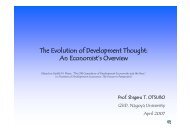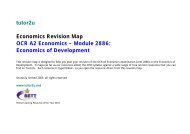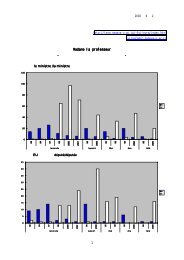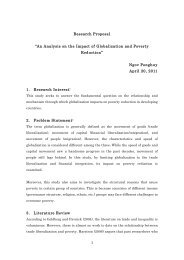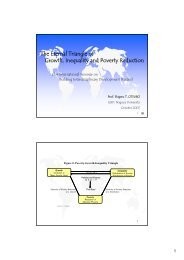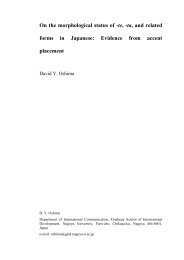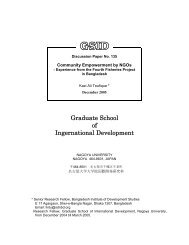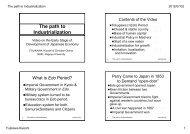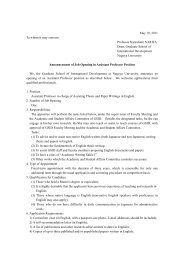Report
Report
Report
You also want an ePaper? Increase the reach of your titles
YUMPU automatically turns print PDFs into web optimized ePapers that Google loves.
122 QUANTIFICATION OF BENEFITS FROM ECONOMIC COOPERATION IN SOUTH ASIA<br />
in hotel services it has offered almost the same commitments<br />
as requested by Sri Lanka. Sri Lanka has special<br />
interest in restaurant and catering services as there are<br />
some small Sri Lankan motels in India (Chennai) which<br />
mainly cater to Sri Lankan tourists, pilgrims, patients,<br />
businesspersons, etc. It has been suggested that there is<br />
significant scope for Sri Lankans to invest in motels in<br />
India in renowned hospitals in the Southern region and<br />
in Buddhist circuits such as Bodhgaya.<br />
Tourism is an important services industry in India.<br />
In recent years India has taken a number of initiatives<br />
to attract foreign tourists. Global and private agencies<br />
have been entrusted with the task of selling India to<br />
international visitors. The Ministry of Tourism has also<br />
made efforts notable among them being the ‘Incredible<br />
India’ spirituality campaign that won the PATA Gold<br />
Award. It has also been suggested that there has been a<br />
marked improvement in the Government of India’s<br />
approach to tourism (WTTC 2003–04).<br />
In the South Asian region unlike Sri Lanka, India<br />
does not provide visa-on-arrival. However, outbound<br />
travel from Sri Lanka to India has been facilitated since<br />
India has offered visa-free travel to groups travelling<br />
on pilgrimage (ESCAP 2005). During 2001–03 Sri<br />
Lanka was the third largest country in terms of sending<br />
tourists to India.<br />
Summary of Restrictions in the<br />
Indian Tourism Sector<br />
• No commitments in restaurant and catering services<br />
• In all three committed subsectors under Mode 3<br />
FDI only though incorporation and in the case of<br />
foreign investors having prior collaboration in these<br />
two subsectors, FIPB approval is required<br />
• No sectoral Mode 4 commitments in hotel and<br />
lodging and travel agencies and tour oprerators<br />
services<br />
• No commitments under Mode 1 in tourist guides<br />
services<br />
• Unlike Sri Lanka, India does not offer visa-onarrival<br />
to tourists from SAARC counties though it<br />
offers visa-free travel to groups traveling on<br />
pilgrimage from Sri Lanka.<br />
Pakistan<br />
During the Uruguay Round Pakistan undertook<br />
commitments in two of the four subsectors of the<br />
tourism and travel related services sector – hotels and<br />
restaurants (including catering) (CPC 614–643) and<br />
travel agencies and tour operator services (CPC 7471).<br />
In these two sub-sectors Pakistan has proposed some<br />
improvements in its initial offer (for details see table B<br />
in chapter 6). While India’s commitments – as proposed<br />
in its revised offer – are wider covering three sub-sectors<br />
of the tourism sector, Pakistan’s commitments in the<br />
sub-sector – hotels and restaurants (including catering)<br />
cover more services than that of India because India<br />
has left restaurants (including catering) services.<br />
Pakistan’s sectoral commitments in tourism services<br />
are relatively liberal, as it has not put any limitations<br />
in Modes 1, 2, and 3 in the Market Access as well as<br />
National Treatment columns in both the subsectors that<br />
have been committed. However, Mode 4 in all cases is<br />
unbound and refers to the horizontal section where this<br />
mode is partially open for movement of natural persons.<br />
Though tourism companies will directly benefit from<br />
the easy entry provisions for the categories of employees<br />
like ICTs (managers, executives, specialists), they will<br />
also benefit from the liberal entry conditions given for<br />
business visitors (business persons and service sales<br />
persons). Further, as the entry of professionals and<br />
independent professionals is allowed they will facilitate<br />
supply of tourism services though entry of independent<br />
professionals seems to be limited to imparting training.<br />
However, the entry of persons having other skills seems<br />
to be the most important provision under Mode 4<br />
because it specifically mentions about the delivery of<br />
tourism services albeit limited to imparting training.<br />
From the analysis of the Pakistani commitments in<br />
tourism services it is clear that though Modes 1, 2, and<br />
3 have been made fully liberal Mode 4 remains relatively<br />
restrictive. This is important because all other countries<br />
from the South Asian region would be looking at<br />
Pakistan as a major market. In this regard, Pakistan<br />
should take more liberal commitments to allow various<br />
categories of persons working in the tourism industry.<br />
In addition, Pakistan should either remove (the condition<br />
of labour market test as given in its commitments<br />
for persons having other skills or it should make the<br />
criteria of the test fairly transparent. Pakistan and other<br />
South Asian countries both would gain from a liberal<br />
Mode 4 regime in Pakistan.<br />
In addition, Pakistan ought to include travel agencies<br />
and tour operators services (CPC 7471) in its<br />
commitments. This sub-sector seems to be quite important<br />
for other SAARC countries which are potential<br />
providers of these services. This will also help Pakistan<br />
in mobilising adequate resources to provide standard<br />
services in this sub-sector.<br />
The tourism industry has been relatively small<br />
compared with other industries, but its role in the




